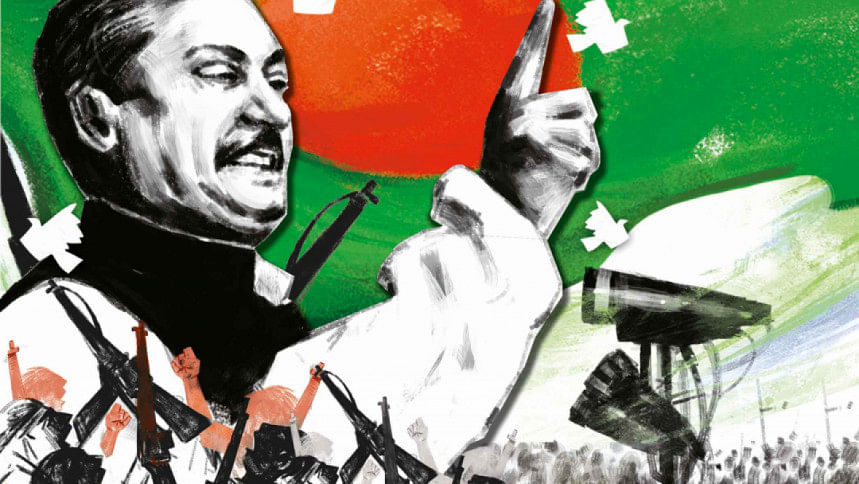Indomitable March: Growing support for Mujib’s demands from both wings
Mujib’s demands garnered widespread support in both wings of Pakistan. Even smaller parties from West Pakistan backed the Awami League. Leaders of West Pakistani parties endorsed Mujib’s four demands and advocated for interim governments at both central and provincial levels. They criticised Bhutto’s insistence on prior agreement on constitutional matters and emphasised Mujib’s commitment to considering suggestions from the majority party. Additionally, they urged Yahya to meet with Sheikh Mujib to address misunderstandings, apprehensions, and suspicions. [Srinath Raghavan, 1971: A Global History of the Creation of Bangladesh, Permanent Black 2013, pg. 46]
Khan Abdul Wali Khan, the leader of the National Awami Party, arrived in Dhaka. During an interview with journalists at the airport, he voiced his complete support for Sheikh Mujib’s demands. He also warned that the current crisis could jeopardise Pakistan’s unity. Khan Abdul Wali Khan demanded the immediate withdrawal of military control and the transfer of power to elected representatives.
‘TEETERING ON THE BRINK’
The Economist, on March 13, 1971, wrote in an article titled “Teetering on the brink” that Martial law was pushing East Pakistan towards declaring independence — unless Sheikh Mujib got the substance of full autonomy.
Commenting on the upcoming visit of Yahya Khan, the paper suggested that the only realistic course for the president appeared to be acknowledging that, in the current situation, only Sheikh Mujib was preventing an outright declaration of independence. The paper recommended that a deal be struck with Mujib while he still maintained control.
Comparing the situation to the one in Biafra where Britain supplied the Nigerian government with arms to crush the secession, The Economist indicated that no British government would wish to get involved in a civil war in Pakistan. They presented the following reasons for the different response: “East Pakistan is a territory whose frontiers already exist. Sheikh Mujib has demonstrably wider support there than General Ojukwu had in the territory claimed for Biafra. The 70 million East Bengalis, culturally distinct from their western partners, not only constitute a nation that qualifies for self-determination by present standards, but actually represent the majority of Pakistan’s whole population.”
CIVILIAN STAFF OF DEFENCE ORDERED TO JOIN DUTY
A martial law order from the headquarters of the Martial Law Administrator Zone ‘B’ instructed all civil employees in East Pakistan to return to work, with a warning that failure to comply would result in dismissal and legal action. Sheikh Mujibur Rahman commented that such an order, amid the Bangalees’ resistance against military rule, would only fuel provocation. He expressed that the people were no longer intimidated by such threats, as they were resolutely committed to achieving their freedom.
LondonGBDESK//



Comments are closed.